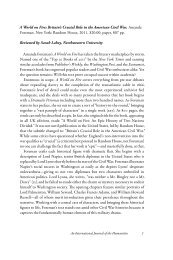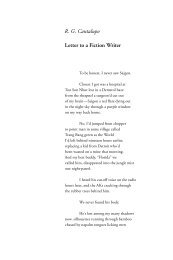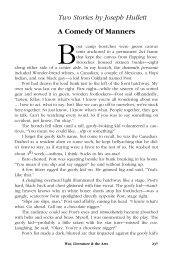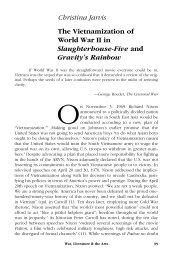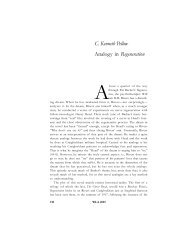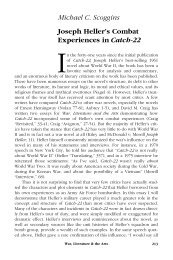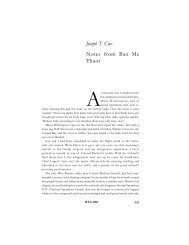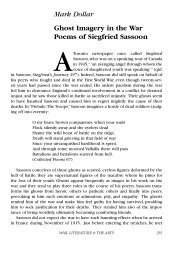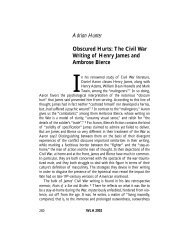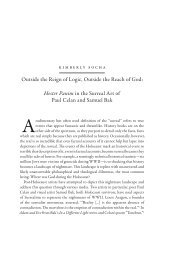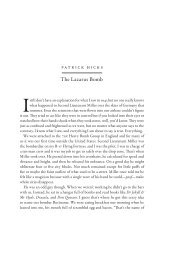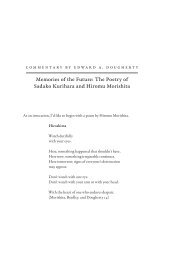War in the Precious Graveyard - War, Literature and the Arts
War in the Precious Graveyard - War, Literature and the Arts
War in the Precious Graveyard - War, Literature and the Arts
Create successful ePaper yourself
Turn your PDF publications into a flip-book with our unique Google optimized e-Paper software.
J a s o n S . R i d l e r<br />
<strong>War</strong> <strong>in</strong> <strong>the</strong> <strong>Precious</strong> <strong>Graveyard</strong>:<br />
Death through <strong>the</strong> Eyes of Guy Sajer<br />
I want to travel <strong>in</strong> Europe, Alyosha, I shall set off from here. And<br />
yet I know that I am only go<strong>in</strong>g to a graveyard, but it is a precious<br />
graveyard, that’s what it is! <strong>Precious</strong> are <strong>the</strong> dead that lie <strong>the</strong>re, every<br />
stone over <strong>the</strong>m speaks of such burn<strong>in</strong>g life <strong>in</strong> <strong>the</strong> past, of passionate<br />
faith <strong>in</strong> <strong>the</strong>ir work, <strong>the</strong>ir truth, <strong>the</strong>ir struggles <strong>and</strong> <strong>the</strong>ir science, that<br />
I know I shall fall on <strong>the</strong> ground <strong>and</strong> kiss those stones <strong>and</strong> weep over<br />
<strong>the</strong>m; though I’m conv<strong>in</strong>ced <strong>in</strong> my heart that its long been noth<strong>in</strong>g<br />
but a graveyard.<br />
—Dostoyevsky, The Bro<strong>the</strong>rs Karamazov<br />
Dostoyevsky’s comments were over a half-century old when Hitler<br />
unleashed <strong>the</strong> Second World <strong>War</strong> on September 1st, 1939. But this image<br />
of Europe as a sacred <strong>and</strong> yet dead place could just as easily describe<br />
<strong>the</strong> rend<strong>in</strong>g of civilization by <strong>the</strong> force of total war that consumed an estimated<br />
forty million of lives on <strong>the</strong> Eastern Front. From that titanic struggle, Guy Sajer<br />
produced The Forgotten Soldier, a narrative account of his war experience fight<strong>in</strong>g<br />
with <strong>the</strong> Germans aga<strong>in</strong>st <strong>the</strong> Soviets.<br />
Sajer’s work has sparked controversy over <strong>the</strong> accuracy <strong>and</strong> verity of his<br />
recollections s<strong>in</strong>ce first be<strong>in</strong>g published <strong>in</strong> serial form <strong>in</strong> France dur<strong>in</strong>g <strong>the</strong><br />
1950s. Military historians have taken him to task over <strong>the</strong> legitimacy of his battle
descriptions <strong>and</strong> <strong>the</strong> accuracy of his troop locations, go<strong>in</strong>g so far as to claim that The<br />
Forgotten Soldier is more of a roman clef than an autobiography. Such arguments<br />
obfuscate <strong>the</strong> true <strong>and</strong> endur<strong>in</strong>g value of The Forgotten Soldier as a profoundly<br />
human document of war experience.<br />
Death dom<strong>in</strong>ates Sajer’s experience. As a survivor of Germany’s defeat, he is torn<br />
between his revulsion for <strong>the</strong> dead that permeated <strong>the</strong> war <strong>and</strong> <strong>the</strong> noblesse oblige of<br />
a soldier to die for his cause. He detests <strong>the</strong> thought of becom<strong>in</strong>g <strong>the</strong> dead, but guilt<br />
from survival makes him idealize <strong>the</strong> act of dy<strong>in</strong>g. Sajer’s compromise is to speak<br />
for <strong>the</strong> dead by writ<strong>in</strong>g his war experiences, giv<strong>in</strong>g his own memories of fallen<br />
comrades a sacred place even <strong>in</strong> defeat. To do this, Sajer dist<strong>in</strong>guishes between<br />
good <strong>and</strong> bad death, conclud<strong>in</strong>g that, even <strong>in</strong> this work of remembrance, he must<br />
remove himself from memory because, as a survivor <strong>in</strong> defeat, he does not belong<br />
alongside his fallen comrades<br />
The Physical Presence of <strong>the</strong> Dead<br />
In civilized society, human be<strong>in</strong>gs are not constantly rem<strong>in</strong>ded of <strong>the</strong>ir fragile<br />
mortality. The presence of death is kept out of <strong>the</strong> day-to-day operations of most<br />
human activities. Where death rema<strong>in</strong>s a constant, such as <strong>in</strong> cemeteries, hospitals<br />
<strong>and</strong> homes for <strong>the</strong> elderly, <strong>the</strong> general populace only go <strong>in</strong>termittently. The physical<br />
reality of death, that is, a dead human body, is kept hidden from <strong>the</strong> daily runn<strong>in</strong>g<br />
of human affairs. Even with<strong>in</strong> <strong>the</strong>ir sacred areas outside <strong>the</strong> normal sphere of<br />
human activities, <strong>the</strong>re is a normalcy we associate with <strong>the</strong> dead. We view <strong>the</strong>m as<br />
still <strong>and</strong> silent versions of <strong>the</strong>ir former liv<strong>in</strong>g selves, <strong>the</strong>ir last liv<strong>in</strong>g moments are<br />
frozen <strong>in</strong> <strong>the</strong> human eye. This is how <strong>the</strong>y are laid to rest, with physical <strong>in</strong>tegrity<br />
<strong>in</strong>tact for <strong>the</strong>ir f<strong>in</strong>al journey.<br />
But <strong>in</strong> war, <strong>the</strong> dead confront <strong>the</strong> liv<strong>in</strong>g every day. They are a product of war<br />
that <strong>in</strong> turn shape <strong>and</strong> def<strong>in</strong>e its l<strong>and</strong>scape <strong>and</strong> <strong>in</strong>habitants. S<strong>in</strong>ce <strong>the</strong> <strong>in</strong>dustrial<br />
revolution, war technology has provided <strong>the</strong> capability for nation states to litter<br />
battlefields with <strong>in</strong>creas<strong>in</strong>g amounts of human rema<strong>in</strong>s. In <strong>the</strong> wake of <strong>the</strong> German<br />
<strong>in</strong>vasion of <strong>the</strong> Soviet Union <strong>in</strong> June 1941, corpses litter both <strong>the</strong> battleground <strong>and</strong><br />
occupied territories of <strong>the</strong> Eastern Front. 1 This is <strong>the</strong> l<strong>and</strong>scape Sajer <strong>in</strong>habits for<br />
three years. Central to his experience is <strong>the</strong> constant presence of death:<br />
Clouds of smoke were ris<strong>in</strong>g all along <strong>the</strong> battered front. We<br />
felt as if we could smell <strong>the</strong> presence of death—<strong>and</strong> by that I<br />
don’t mean <strong>the</strong> process of decomposition, but <strong>the</strong> smell that<br />
emanates from death when its proportions have reached a<br />
certa<strong>in</strong> magnitude. Anyone who has been on a battlefield<br />
knows what I mean. 2<br />
86 <strong>War</strong>, <strong>Literature</strong> & <strong>the</strong> <strong>Arts</strong>
Travell<strong>in</strong>g among <strong>the</strong> dead, Sajer is repulsed by <strong>the</strong>ir state, a constant rem<strong>in</strong>der<br />
of <strong>the</strong> end of th<strong>in</strong>gs. Their presence deepens his commitment to survival <strong>in</strong> <strong>the</strong> war<br />
when all o<strong>the</strong>r reason had vanished.<br />
Perversions of Normalcy<br />
It is normal to expect corpses as products of battle, strewn where <strong>the</strong>y fell. But<br />
<strong>the</strong> more uncomfortable reality is that <strong>the</strong> dead are permanent fixtures throughout<br />
<strong>the</strong> l<strong>and</strong>scape of war, encroach<strong>in</strong>g upon <strong>the</strong> liv<strong>in</strong>g when battle has ended. Soldiers<br />
must carry on acts of normalcy despite <strong>the</strong> grotesque surround<strong>in</strong>g of human debris.<br />
After <strong>the</strong> <strong>in</strong>itial fight<strong>in</strong>g <strong>in</strong> Belgorod, Sajer <strong>and</strong> comrades must work to clear human<br />
rema<strong>in</strong>s before <strong>the</strong> call of <strong>the</strong> next offensive. We witness differ<strong>in</strong>g views of <strong>the</strong> dead<br />
from youths <strong>and</strong> <strong>the</strong> old soldier referred to as “<strong>the</strong> veteran.”<br />
Our first job was to get rid of some thirty Bolshevik corpses<br />
scattered through <strong>the</strong> rubble. We dumped <strong>the</strong>m <strong>in</strong>to a small<br />
garden, which must once have been cultivated. The day was hot<br />
<strong>and</strong> heavy. A greasy sun threw sharp shadows, <strong>and</strong> made squ<strong>in</strong>t<br />
<strong>in</strong> <strong>the</strong> harsh light, which emphasized every hollow <strong>in</strong> our<br />
exhausted faces. The same light poured down onto <strong>the</strong> faces of<br />
<strong>the</strong> dead Russians, whose fixed eyes were opened <strong>in</strong>ord<strong>in</strong>ately<br />
wide. Look<strong>in</strong>g at <strong>the</strong>m, <strong>and</strong> th<strong>in</strong>k<strong>in</strong>g about us all, made my<br />
stomach turn over.<br />
“Isn’t it funny,” <strong>the</strong> Sudeten remarked calmly, “how quickly<br />
a fellow’s beard grows when he’s dead? Look at this one.” He<br />
turned over a body with his foot. The man’s tunic was torn by<br />
seven or eight bloody holes. “He probably shaved yesterday, just<br />
before he was killed. And look at him now. He’s got a beard on<br />
him that would have taken a week o<strong>the</strong>rwise.”<br />
“See this one,” laughed ano<strong>the</strong>r fellow, who was clear<strong>in</strong>g out<br />
a build<strong>in</strong>g which had been hit by a heavy mortar shell. He was<br />
dragg<strong>in</strong>g a Russian soldier whose head had been blown off.<br />
“You’d do better to go <strong>and</strong> shave yourself, if you want<br />
anyone to recognize you when it’s your turn tomorrow. You<br />
give me pa<strong>in</strong> with your idiotic remarks. Anyone would th<strong>in</strong>k<br />
that’s <strong>the</strong> first stiff you’ve ever seen.” The veteran sat down on a<br />
heap of rubble, <strong>and</strong> opened his mess t<strong>in</strong>. 3<br />
The reaction to <strong>the</strong> dead is not universal. To each soldier <strong>the</strong>y produce feel<strong>in</strong>gs<br />
of revulsion, curiosity, humour <strong>and</strong> <strong>in</strong>difference. The veteran’s <strong>in</strong>difference to <strong>the</strong><br />
presence of <strong>the</strong> dead does not impede him from eat<strong>in</strong>g. Sajer <strong>and</strong> his comrade<br />
An International Journal of <strong>the</strong> Humanities 87
Hals, by comparison, can only look at <strong>the</strong> dead with fear. Feel<strong>in</strong>g sick after a<br />
battle, Hals cannot eat or dr<strong>in</strong>k: “ ‘I just feel like vomit<strong>in</strong>g, I’m just so tired—<strong>and</strong><br />
those fellows over <strong>the</strong>re don’t help ei<strong>the</strong>r.’ He nodded at <strong>the</strong> thirty putrefy<strong>in</strong>g<br />
corpses <strong>in</strong> <strong>the</strong> little garden.” 4<br />
This disgust toward <strong>the</strong> dead follows him <strong>in</strong>to <strong>the</strong>ir natural habitat <strong>in</strong> war: <strong>the</strong><br />
battlefield. They lie as a constant rem<strong>in</strong>der of a soldier’s fate. Follow<strong>in</strong>g this meal<br />
<strong>the</strong> men advance through a “frightful slaughter<strong>in</strong>g ground of Hitlerjugend, mixed<br />
<strong>in</strong>to <strong>the</strong> dirt of <strong>the</strong> bombardment of <strong>the</strong> day before.” “Each step made us realize<br />
with fresh horror what could become of our miserable flesh.” Sajer realizes <strong>the</strong><br />
dist<strong>in</strong>ct relationship between himself <strong>and</strong> <strong>the</strong> dead <strong>in</strong> whose footsteps he is now<br />
march<strong>in</strong>g. On this battleground, Hals’ earlier revulsion becomes anger. He too is<br />
rem<strong>in</strong>ded of <strong>the</strong> fate that awaits <strong>the</strong>m, wish<strong>in</strong>g someone had removed such evidence.<br />
“ ‘Somebody should have buried all this m<strong>in</strong>cemeat so we wouldn’t have to look,’<br />
Hals grumbled. Everyone laughed, as if he had just said someth<strong>in</strong>g funny.” 5<br />
Black humour distances soldiers from <strong>the</strong>ir natural horror of <strong>the</strong> dead, allow<strong>in</strong>g<br />
for a pragmatic view of corpses, a gradual process required by <strong>the</strong> dem<strong>and</strong>s of liv<strong>in</strong>g<br />
<strong>in</strong> wartime. Initially, Sajer is shocked by <strong>the</strong> Russian’s utilitarian use of <strong>the</strong> dead.<br />
While <strong>in</strong> Pol<strong>and</strong> he <strong>and</strong> Hals observe a tra<strong>in</strong>load of Russian prisoners bound for<br />
<strong>the</strong> <strong>in</strong>terior. Bodies are piled up at one end <strong>and</strong> each cart is near its burst<strong>in</strong>g po<strong>in</strong>t.<br />
“Did you see that?” [Hals] whispered.<br />
“They’ve piled up <strong>the</strong>ir dead to shield <strong>the</strong>mselves from <strong>the</strong><br />
w<strong>in</strong>d.” In my stupefaction I could only reply with someth<strong>in</strong>g<br />
like a groan. Every car was carry<strong>in</strong>g a shield of human bodies.<br />
I stood as if petrified by <strong>the</strong> horror of <strong>the</strong> sight roll<strong>in</strong>g by:<br />
faces entirely dra<strong>in</strong>ed of blood, <strong>and</strong> bare feet stiffened by<br />
death <strong>and</strong> cold. 6<br />
The horror lies <strong>in</strong> see<strong>in</strong>g <strong>the</strong> dead dis<strong>in</strong>terred <strong>and</strong>, perversely, used as tools, devoid<br />
of <strong>the</strong> dignity that civilized people expect from <strong>the</strong> dead. The bodies now possess<br />
pragmatic value that flies <strong>in</strong> <strong>the</strong> face of <strong>the</strong> sacred. In war, <strong>the</strong>y have become tools<br />
for <strong>the</strong> liv<strong>in</strong>g.<br />
By <strong>the</strong> f<strong>in</strong>al days of <strong>the</strong> war, with <strong>the</strong> Russians clearly march<strong>in</strong>g toward<br />
victory, witness<strong>in</strong>g death becomes banal. Dur<strong>in</strong>g <strong>the</strong> w<strong>in</strong>ter fight<strong>in</strong>g north of<br />
Boporoeivska, 1944-45, Sajer recounts <strong>the</strong> vast numbers of Mongol soldiers<br />
employed on a m<strong>in</strong>efield.<br />
Their function was to knock out <strong>the</strong> m<strong>in</strong>efield, by cross<strong>in</strong>g it.<br />
As <strong>the</strong> Russians preferred to economize on tanks, <strong>and</strong> as <strong>the</strong>ir<br />
human stockpile was enormous, <strong>the</strong>y usually sent out <strong>the</strong>ir<br />
88 <strong>War</strong>, <strong>Literature</strong> & <strong>the</strong> <strong>Arts</strong>
men for jobs of this k<strong>in</strong>d…. The m<strong>in</strong>efield exploded under<br />
<strong>the</strong> howl<strong>in</strong>g mob, <strong>and</strong> we sent out a curta<strong>in</strong> of yellow <strong>and</strong><br />
white fire to obliterate anyone who survived. The fragmented<br />
cadavers froze very quickly, spar<strong>in</strong>g us <strong>the</strong> stench which would<br />
o<strong>the</strong>rwise have polluted <strong>the</strong> air over a vast area. 7<br />
There is an acclimatized perspective of <strong>the</strong> dead’s place on <strong>the</strong> battlefield, reflected<br />
by Sajer’s relief at <strong>the</strong>ir lack of stench.<br />
Sajer also dist<strong>in</strong>guishes <strong>the</strong> dead as “fragmented cadavers.” This dist<strong>in</strong>ction is<br />
significant <strong>in</strong> underst<strong>and</strong><strong>in</strong>g <strong>the</strong> horrific reality of Sajer’s combat experience <strong>and</strong>,<br />
perhaps, as evidence toward <strong>the</strong> verity of his account. Writer <strong>and</strong> veteran Paul<br />
Fussell has argued that most history books fail to portray <strong>the</strong> gruesome reality<br />
of war. He accuses <strong>the</strong> most popular American <strong>and</strong> British pictorial works of <strong>the</strong><br />
Second World <strong>War</strong> of show<strong>in</strong>g only whole bodies, be <strong>the</strong>y dead or wounded, <strong>and</strong><br />
turn<strong>in</strong>g a bl<strong>in</strong>d eye to <strong>the</strong> more “realistic” side of combat:<br />
In <strong>the</strong>se [works], no matter how severely wounded, Allied<br />
troops are never shown suffer<strong>in</strong>g what was termed, <strong>in</strong> <strong>the</strong><br />
Vietnam <strong>War</strong>, traumatic amputation: everyone has all of his<br />
limbs, h<strong>and</strong>s <strong>and</strong> feet <strong>and</strong> digits, not to mention expressions<br />
of courage <strong>and</strong> cheer. And recall<strong>in</strong>g Shakespeare <strong>and</strong> Goya,<br />
it would be a mistake to assume that dismember<strong>in</strong>g was<br />
more common when warfare was largely a matter of cutt<strong>in</strong>g<br />
weapons, like swords <strong>and</strong> sabers. Their results are noth<strong>in</strong>g<br />
compared to <strong>the</strong> work of bombs, mach<strong>in</strong>e guns, pieces of shell,<br />
<strong>and</strong> high explosives <strong>in</strong> general. 8<br />
Part of this hesitancy towards <strong>the</strong> reality of combat, of course, is a natural<br />
revulsion to <strong>the</strong> horrors of death, but it also grates aga<strong>in</strong>st our civilized view of<br />
<strong>the</strong> dead as rema<strong>in</strong><strong>in</strong>g whole. We wish to view <strong>the</strong> dead as we remembered <strong>the</strong>m <strong>in</strong><br />
life. It normalizes <strong>the</strong> experience of watch<strong>in</strong>g a loved one die. A “normal” corpse is<br />
<strong>in</strong>tegrally sound.<br />
But as Fussell <strong>and</strong> o<strong>the</strong>rs have demonstrated, whole cadavers are not <strong>the</strong> norm<br />
<strong>in</strong> modern warfare. Death <strong>in</strong> combat requires a render<strong>in</strong>g of a whole human be<strong>in</strong>g<br />
<strong>in</strong>to parts, fragments, <strong>and</strong> undist<strong>in</strong>guishable “human material” on <strong>the</strong> battlefield,<br />
fur<strong>the</strong>r distanc<strong>in</strong>g <strong>the</strong>ir association from <strong>the</strong>ir actual existence. Sajer’s narrative,<br />
unlike <strong>the</strong> ones Fussell attacks, is rife with <strong>the</strong>se visceral horrors, as <strong>the</strong> “m<strong>in</strong>cemeat”<br />
of <strong>the</strong> Hitlerjugend illustrates.<br />
On several occasions Sajer chooses to dist<strong>in</strong>guish between a “corpse”, “cadaver” or<br />
o<strong>the</strong>r term mean<strong>in</strong>g whole with fragmented or mutilated human rema<strong>in</strong>s. While <strong>the</strong><br />
An International Journal of <strong>the</strong> Humanities 89
shock of see<strong>in</strong>g dead bodies wears off, replaced by a resigned dread, Sajer ma<strong>in</strong>ta<strong>in</strong>s<br />
a greater degree of revulsion for “pieces” of human rema<strong>in</strong>s, especially those that<br />
have been mistreated or degraded. Such grisly fates keep him from embrac<strong>in</strong>g<br />
death: <strong>the</strong>re is noth<strong>in</strong>g sacred about a mutilated corpse. His first experience with<br />
such mutilations, however, comes from <strong>the</strong> liv<strong>in</strong>g. In a field hospital, Sajer holds a<br />
man’s leg as it is amputated. “I rema<strong>in</strong>ed <strong>in</strong> ludicrous <strong>and</strong> tragic attitude, hold<strong>in</strong>g<br />
my hideous burden. I thought I was go<strong>in</strong>g to fa<strong>in</strong>t.” 9 This is followed by degradation<br />
of <strong>the</strong> dead on <strong>the</strong> ground. As his unit marches toward <strong>the</strong> East, he is shocked to<br />
witness cats eat<strong>in</strong>g a corpse’s h<strong>and</strong> <strong>in</strong> a bunker. A Lieutenant, possibly fear<strong>in</strong>g how<br />
<strong>the</strong> scene is affect<strong>in</strong>g his men, throws a grenade <strong>in</strong>to <strong>the</strong> bunker, send<strong>in</strong>g “a column<br />
of more or less human debris <strong>in</strong>to <strong>the</strong> air, like a chimney.” Pragmatically, someone<br />
quips that “If <strong>the</strong> cats are eat<strong>in</strong>g stiffs… <strong>the</strong>re couldn’t be much left <strong>in</strong> <strong>the</strong> pantry,”<br />
though Sajer does not share his humour. 10<br />
The dead are also not to be trusted. With disgust, Sajer tells us of Stal<strong>in</strong>’s order<br />
to have bodies booby-trapped <strong>and</strong> mutilated; fallen comrades are made tools of <strong>the</strong><br />
enemy. 11 Sajer cannot fathom his body becom<strong>in</strong>g a weapon. But <strong>the</strong>ir desecration,<br />
more than <strong>the</strong>ir lethality, cont<strong>in</strong>ues to horrify him. In <strong>the</strong> clos<strong>in</strong>g action of <strong>the</strong> war,<br />
Sajer <strong>and</strong> his comrades <strong>in</strong>vestigate a blockhouse with six mutilated bodies ly<strong>in</strong>g <strong>in</strong><br />
black blood. Two were so repulsive <strong>the</strong>y could not be looked at. “Two soldiers…<br />
who had seen appall<strong>in</strong>g horrors… hid <strong>the</strong>ir faces <strong>in</strong> <strong>the</strong>ir h<strong>and</strong>s <strong>and</strong> walked away.<br />
None of us had ever seen anyth<strong>in</strong>g so gratuitously horrible.” 12 Sajer’s distaste of <strong>the</strong><br />
dead crystallizes as he f<strong>in</strong>ds <strong>the</strong>m a home beneath war’s septic soil.<br />
No Sacred Ground<br />
In peace, <strong>the</strong> dead do not dwell among <strong>the</strong> liv<strong>in</strong>g but are appropriated a place of<br />
rest out of sight, visited only on sacred occasions. As <strong>the</strong> fight<strong>in</strong>g <strong>in</strong> <strong>the</strong> Eastern Front<br />
consumed life at an <strong>in</strong>credible rate, graves were also dug <strong>in</strong> haste to accommodate<br />
<strong>the</strong>ir <strong>in</strong>creas<strong>in</strong>g numbers. But <strong>the</strong> graves of a war zone differ greatly from those of<br />
<strong>the</strong> civilized world. Sajer’s experience work<strong>in</strong>g with <strong>the</strong> dead reveal war’s degrad<strong>in</strong>g<br />
<strong>in</strong>fluence on a sacred act <strong>in</strong> human affairs, <strong>and</strong> heighten his resistance to sacrifice<br />
<strong>and</strong> his embrac<strong>in</strong>g of survival.<br />
In <strong>the</strong> civilized world, <strong>the</strong> dead are placed <strong>in</strong> sacred ground, with religious<br />
markers used to denote <strong>the</strong> f<strong>in</strong>al rest<strong>in</strong>g place of <strong>the</strong> actual human rema<strong>in</strong>s. This<br />
norm is translated by <strong>the</strong> conditions of war to reflect both <strong>the</strong> values of home <strong>and</strong> <strong>the</strong><br />
realities of <strong>the</strong> battlefield, which become all encompass<strong>in</strong>g. Sajer often portrays <strong>the</strong><br />
whole environment of war as a graveyard, devoid of <strong>the</strong> preciousness Dostoyevsky<br />
attributed to Europe <strong>in</strong> <strong>the</strong> n<strong>in</strong>eteenth century. After <strong>the</strong> gr<strong>and</strong> fight<strong>in</strong>g <strong>in</strong> Kiev, he<br />
views a “l<strong>and</strong>scape littered with carcasses of tanks, trucks, guns <strong>and</strong> aircraft, gutted<br />
<strong>and</strong> burned, a scatter<strong>in</strong>g of junk which stretched as far as <strong>the</strong> eye could see.” Next<br />
90 <strong>War</strong>, <strong>Literature</strong> & <strong>the</strong> <strong>Arts</strong>
to <strong>the</strong>m he sees “Here <strong>and</strong> <strong>the</strong>re, crosses or stakes marked <strong>the</strong> hasty burial of <strong>the</strong><br />
thous<strong>and</strong>s of German <strong>and</strong> Russian soldiers who had fallen on <strong>the</strong> pla<strong>in</strong>.” 13<br />
This appearance of mutual respect for <strong>the</strong> war dead on both sides is deceiv<strong>in</strong>g.<br />
Sajer notes <strong>the</strong> difference <strong>in</strong> how comrade <strong>and</strong> enemy were buried.<br />
In fact, many more Russians <strong>and</strong> Germans had been killed.<br />
However, <strong>in</strong>sofar as was possible, <strong>the</strong> soldiers of <strong>the</strong> Reich<br />
were given decent burials, while each orthodox emblem<br />
marked <strong>the</strong> grave of ten or twelve Soviet soldiers. Our<br />
journey through across this boneyard naturally did not make<br />
us feel any warmer 14<br />
From what Sajer imparts, a “decent” burial meant an <strong>in</strong>dividual place of rest, as<br />
<strong>in</strong> a cemetery, not <strong>the</strong> expedient mass graves that would litter <strong>the</strong> Eastern Front,<br />
suitable only for <strong>the</strong> enemy. As <strong>the</strong> war <strong>in</strong> <strong>the</strong> East <strong>in</strong>tensified, <strong>the</strong> importance of<br />
<strong>in</strong>dividual graves degrades, as does <strong>the</strong> sanctity of <strong>the</strong> dead. Burial squads were<br />
formed to ga<strong>the</strong>r bodies. Initially, Russian prisoners were tasked with this duty:<br />
[B]ut it seemed <strong>the</strong>y had taken to robb<strong>in</strong>g <strong>the</strong> bodies, steal<strong>in</strong>g<br />
wedd<strong>in</strong>g r<strong>in</strong>gs <strong>and</strong> o<strong>the</strong>r pieces of jewelry…. Every prisoner<br />
caught robb<strong>in</strong>g a German body was immediately shot. There<br />
were no official fir<strong>in</strong>g squads for <strong>the</strong>se executions. An officer<br />
would simply shoot <strong>the</strong> offender on <strong>the</strong> spot, or h<strong>and</strong> him over<br />
to a couple of toughs who were regularly given this sort of job. 15<br />
Upon reach<strong>in</strong>g this f<strong>in</strong>al rest<strong>in</strong>g-place, <strong>the</strong> dead were to be treated with some<br />
reverence. For such, only German soldiers could be entrusted with <strong>the</strong>ir care.<br />
Recover<strong>in</strong>g <strong>the</strong> dead required disengaged participants. Bodies were often<br />
scattered <strong>in</strong> <strong>the</strong> rubble of battle, <strong>and</strong> to reach <strong>the</strong>m required less than idealistic<br />
means. Sajer’s is assigned to a “burial party” to dig out an ab<strong>and</strong>oned emergency<br />
hospital partially buried after a recent attack. The grim task is adhered to with a<br />
mix of horror <strong>and</strong> complacency. Each bed had black<br />
…stiffened <strong>and</strong> mutilated bodies. From time to time, an empty<br />
space marked <strong>the</strong> f<strong>in</strong>al flight of a dy<strong>in</strong>g man…. There was no<br />
light <strong>in</strong> this charnel house, except from <strong>the</strong> electric torches<br />
which some of us had fastened to our tunics. These threw<br />
beams of horrify<strong>in</strong>g illum<strong>in</strong>ation on <strong>the</strong> th<strong>in</strong>, swollen faces of<br />
<strong>the</strong> cadavers, which we had to pull out with hooks 16<br />
An International Journal of <strong>the</strong> Humanities 91
Here we see a clash of values. To save <strong>the</strong> dead, to get <strong>the</strong>m to <strong>the</strong>ir rightful place,<br />
<strong>the</strong>y must be mutilated. The realities of <strong>the</strong> war become <strong>the</strong> dom<strong>in</strong>ant value. Sajer<br />
must ru<strong>in</strong> <strong>the</strong> dead to get <strong>the</strong>m out of <strong>the</strong> way of <strong>the</strong> liv<strong>in</strong>g.<br />
In war, <strong>the</strong> liv<strong>in</strong>g struggle with <strong>the</strong> dead for primacy of place. The dead are to<br />
be expected but <strong>the</strong>y are constantly <strong>in</strong> <strong>the</strong> way. Their physical presence becomes<br />
a burden to <strong>the</strong> liv<strong>in</strong>g, deplet<strong>in</strong>g <strong>the</strong>ir sacred value. After <strong>the</strong> hellish fight<strong>in</strong>g of<br />
Belgorod, Sajer <strong>and</strong> Hals seem to have lost much of <strong>the</strong>ir former reverence <strong>and</strong><br />
sympathy for <strong>the</strong> dead. They thankfully avoid play<strong>in</strong>g <strong>the</strong> “undertaker’s assistant”<br />
<strong>in</strong> ano<strong>the</strong>r burial squad but watch <strong>the</strong> men deal<strong>in</strong>g with <strong>the</strong>ir dead comrades with<br />
dull fasc<strong>in</strong>ation.<br />
“Fuck it… this fellow weighs a ton.”<br />
“My God… he would have been better of if <strong>the</strong>y’d f<strong>in</strong>ished<br />
him right away. Look at that!”<br />
And <strong>the</strong>n <strong>the</strong> metallic click as <strong>the</strong> identity tags slid off.<br />
“Pach… he’s swimm<strong>in</strong>g <strong>in</strong> shit!”<br />
We looked away with <strong>in</strong>difference; death had lost dramatic<br />
importance for us; we were used to it. While <strong>the</strong> o<strong>the</strong>rs were<br />
shift<strong>in</strong>g <strong>the</strong> carrion, Hals <strong>and</strong> I cont<strong>in</strong>ued to discuss our<br />
chances of survival. 17<br />
Survival becomes Sajer’s watchword. He has moved among <strong>the</strong> dead, watch<strong>in</strong>g<br />
<strong>the</strong>m fade <strong>in</strong> his m<strong>in</strong>d as sacred be<strong>in</strong>gs <strong>and</strong> become <strong>the</strong> lifeless rubble of modern war.<br />
He has no wish to jo<strong>in</strong> <strong>the</strong>ir ranks, but this pull is challenged by <strong>the</strong> <strong>in</strong>stitution that<br />
has brought him to <strong>the</strong> precious graveyard <strong>in</strong> <strong>the</strong> first place. As a soldier, kill<strong>in</strong>g is<br />
only one part of victory. For <strong>the</strong> Germans, death was its <strong>in</strong>dispensable <strong>in</strong>gredient.<br />
Death as Obligation<br />
<strong>War</strong> dem<strong>and</strong>s death from those who wage it, <strong>and</strong> <strong>the</strong> Second World <strong>War</strong> rivaled<br />
all previous conflicts by dem<strong>and</strong><strong>in</strong>g millions on both sides to give <strong>the</strong> “<strong>the</strong> ultimate<br />
sacrifice.” Death is one of <strong>the</strong> unique dem<strong>and</strong>s <strong>the</strong> military makes of its members,<br />
<strong>and</strong> because it contrasts with man’s basic goal for survival, <strong>the</strong> military has made<br />
death, or sacrifice, a virtue, one that has become less <strong>and</strong> less entic<strong>in</strong>g as st<strong>and</strong>ards of<br />
liv<strong>in</strong>g have <strong>in</strong>creased. At <strong>the</strong> turn of <strong>the</strong> century, German Colonel Wilhelm Balck,<br />
author of <strong>the</strong> <strong>in</strong>fluential treatises Tactiks, feared that <strong>the</strong> post-<strong>in</strong>dustrial boom <strong>in</strong><br />
Europe had degraded soldierly virtue:<br />
We should not forget that our modern personnel have<br />
become more susceptible to <strong>the</strong> impressions of battle. The<br />
steady improvements of st<strong>and</strong>ard of liv<strong>in</strong>g tend to <strong>in</strong>crease<br />
92 <strong>War</strong>, <strong>Literature</strong> & <strong>the</strong> <strong>Arts</strong>
<strong>the</strong> <strong>in</strong>st<strong>in</strong>ct for self preservation <strong>and</strong> to dim<strong>in</strong>ish <strong>the</strong> spirit<br />
of self-sacrifice. The spirit of <strong>the</strong> times looks upon war as an<br />
avoidable evil <strong>and</strong> militates directly aga<strong>in</strong>st <strong>the</strong> k<strong>in</strong>d of courage<br />
that despises death. The fast manner of liv<strong>in</strong>g at <strong>the</strong> present<br />
underm<strong>in</strong>es <strong>the</strong> nervous system; <strong>and</strong> <strong>the</strong> fanaticism, <strong>the</strong><br />
religious <strong>and</strong> national enthusiasm of yesterday are gone; f<strong>in</strong>ally,<br />
<strong>the</strong> physical powers of <strong>the</strong> human be<strong>in</strong>g are also on <strong>the</strong> wane. 18<br />
German Fuehrer Adolf Hitler heightened <strong>the</strong> need for fanaticism <strong>and</strong> sacrifice<br />
as he began his conquest <strong>in</strong> Europe. In September of 1941, he <strong>in</strong>formed his generals<br />
that he <strong>in</strong>tended not to conquer Pol<strong>and</strong> but to destroy it, <strong>in</strong> order to make room for<br />
German Empire <strong>in</strong> <strong>the</strong> east:<br />
The idea of treat<strong>in</strong>g war as anyth<strong>in</strong>g o<strong>the</strong>r than <strong>the</strong> harshest<br />
means of settl<strong>in</strong>g questions of very existence is ridiculous….<br />
Every war costs blood, <strong>and</strong> <strong>the</strong> smell of blood arouses <strong>in</strong> man<br />
all <strong>the</strong> <strong>in</strong>st<strong>in</strong>cts that have la<strong>in</strong> with us s<strong>in</strong>ce <strong>the</strong> beg<strong>in</strong>n<strong>in</strong>g of<br />
<strong>the</strong> world: deeds of violence, <strong>the</strong> <strong>in</strong>toxication of murder, <strong>and</strong><br />
many o<strong>the</strong>r th<strong>in</strong>gs. Everyth<strong>in</strong>g else is babble. A humane war<br />
exists only <strong>in</strong> bloodless bra<strong>in</strong>s. 19<br />
Sajer acknowledges Hitler’s claim when confront<strong>in</strong>g death is an active presence<br />
on <strong>the</strong> battlefield, “The only leader I know who f<strong>in</strong>ally made a sensible remark on<br />
this po<strong>in</strong>t, Adolf Hitler, once said to his troops: ‘Even a victorious army must count<br />
its victims.’ ” 20 Sajer’s own desire for self-preservation was soon challenged not only<br />
by enemy fire but <strong>the</strong> German military’s ethos of death as a soldier’s obligation.<br />
Dur<strong>in</strong>g <strong>the</strong> Second World <strong>War</strong>, <strong>the</strong> German military struggled to imbue <strong>the</strong><br />
virtue of death upon its soldiers. The war <strong>in</strong> <strong>the</strong> east was to be one of annihilation<br />
<strong>and</strong> exterm<strong>in</strong>ation. Death would be sequestered as an ally <strong>in</strong> this struggle, carry<strong>in</strong>g<br />
a tone <strong>and</strong> degree of visceral importance that would be hard to imag<strong>in</strong>e <strong>in</strong> Western<br />
armies. Before go<strong>in</strong>g <strong>in</strong>to <strong>the</strong> storm of battle at Belgorod, Sajer listens to a Capta<strong>in</strong>’s<br />
speech on <strong>the</strong> need for sacrifice:<br />
Not one of us has <strong>the</strong> right to fl<strong>in</strong>ch or falter <strong>in</strong> <strong>the</strong> face of<br />
momentary discouragement. No one has <strong>the</strong> right to doubt<br />
<strong>the</strong> heroism daily confirmed by our fresh victories. We all<br />
have to bear <strong>the</strong> same suffer<strong>in</strong>gs, <strong>and</strong> deal<strong>in</strong>g with <strong>the</strong>m as<br />
a unified group is <strong>the</strong> best way of surmount<strong>in</strong>g <strong>the</strong>m. Never<br />
forget <strong>the</strong> nation owes you everyth<strong>in</strong>g, <strong>and</strong> that <strong>in</strong> return<br />
it expects everyth<strong>in</strong>g from you, up to <strong>and</strong> <strong>in</strong>clud<strong>in</strong>g <strong>the</strong><br />
An International Journal of <strong>the</strong> Humanities 93
supreme sacrifice. You must learn to support suffer<strong>in</strong>g without<br />
compla<strong>in</strong>t, because you are German. Heil Hitler! 21<br />
The elite Gross Deutschl<strong>and</strong> unit that Sajer volunteers for fur<strong>the</strong>r champions<br />
this ethos. The gateway to <strong>the</strong> tra<strong>in</strong><strong>in</strong>g camp presents <strong>the</strong> motivational slogan<br />
<strong>in</strong>scribed <strong>in</strong> large black letters aga<strong>in</strong>st a white background: “We Are Born to Die. I<br />
don’t th<strong>in</strong>k anyone could pass through that gate without a swallow of fear. A little<br />
fur<strong>the</strong>r on ano<strong>the</strong>r sign bore <strong>the</strong> worlds ICH DIENE (I Serve).” 22 It took no stretch<br />
of imag<strong>in</strong>ation for Sajer or his comrades to see that death was not to be feared, but<br />
embraced. Indeed, death, like hardship, was <strong>the</strong>ir obligation as German soldier.<br />
This was no idle comment for <strong>the</strong> Gross Deutschl<strong>and</strong>. Death was active <strong>in</strong> <strong>the</strong>ir<br />
tra<strong>in</strong><strong>in</strong>g camp as an outcome of poor results. Hellish <strong>and</strong> <strong>in</strong>tense, tra<strong>in</strong>ees that<br />
could not pull <strong>the</strong>ir weight suffered depravity. The tra<strong>in</strong><strong>in</strong>g camp provided a hut<br />
for discipl<strong>in</strong><strong>in</strong>g <strong>the</strong> <strong>in</strong>efficient. Here, accused loafers were beaten <strong>and</strong> tortured<br />
while cha<strong>in</strong>ed to a beam. Sajer recounts two men dy<strong>in</strong>g from <strong>the</strong>ir beat<strong>in</strong>gs, one<br />
from a coma <strong>and</strong> ano<strong>the</strong>r shot for not pull<strong>in</strong>g his weight. 23 Even here, away from<br />
<strong>the</strong> front, death was a constant. As <strong>the</strong> capta<strong>in</strong> of <strong>the</strong> tra<strong>in</strong><strong>in</strong>g camp swears <strong>the</strong>m<br />
<strong>in</strong>to <strong>the</strong> <strong>in</strong>fantry, <strong>the</strong> unit conducts precision march<strong>in</strong>g. “When we had reached<br />
<strong>the</strong> stipulated distance—about seven or eight yards—we snapped to attention,<br />
<strong>and</strong> declared <strong>in</strong> a loud, clear voice, “I swear to serve Germany <strong>and</strong> <strong>the</strong> Führer until<br />
victory or death.” 24 Sajer, like Hitler, knows that one cannot be had without <strong>the</strong><br />
o<strong>the</strong>r. As <strong>the</strong> war turns aga<strong>in</strong>st Germany, however, victory <strong>and</strong> death separate from<br />
each o<strong>the</strong>r, <strong>and</strong> Sajer struggles with his own existence <strong>in</strong> <strong>the</strong> face of defeat.<br />
Death <strong>and</strong> <strong>the</strong> Soldier<br />
Philosopher <strong>and</strong> Western Front veteran J. Glen Gray, <strong>in</strong> his touchstone work The<br />
<strong>War</strong>riors: Reflection of Men <strong>in</strong> Battle, dedicates an entire chapter to underst<strong>and</strong><strong>in</strong>g<br />
<strong>the</strong> soldier’s relationship with death. Gray emphasizes that <strong>in</strong> battle, soldiers face<br />
a perpetual NOW that obliterates self-analysis, <strong>and</strong> allows tra<strong>in</strong><strong>in</strong>g <strong>and</strong> group<br />
dynamics to carry <strong>the</strong>m past fear of <strong>the</strong>ir own mortality. They are caught up<br />
…<strong>in</strong>to <strong>the</strong> fire of communal ecstasy <strong>and</strong> forget about death by<br />
los<strong>in</strong>g <strong>in</strong>dividuality, or <strong>the</strong>y can function like cells <strong>in</strong> a military<br />
organism, do<strong>in</strong>g what is expected of <strong>the</strong>m because of warfare<br />
can still be carried on by men who act as automatons, behav<strong>in</strong>g<br />
almost as mechanical as <strong>the</strong> mach<strong>in</strong>es <strong>the</strong>y operate. 25<br />
But Sajer’s narrative is a recollection of those moments when analysis is impossible.<br />
This distance <strong>in</strong> time allows him to comment on those moments before tra<strong>in</strong><strong>in</strong>g<br />
takes over <strong>and</strong> <strong>the</strong> soldier acts as a “automaton.” He is only able to do this, of course,<br />
94 <strong>War</strong>, <strong>Literature</strong> & <strong>the</strong> <strong>Arts</strong>
ecause he survives. In do<strong>in</strong>g so, Sajer feels guilty of committ<strong>in</strong>g a crime: avoid<strong>in</strong>g<br />
<strong>the</strong> death owed to <strong>the</strong> army.<br />
One’s Own Death<br />
For most green combat soldiers, one’s own death is unth<strong>in</strong>kable; only experience<br />
dissolves this feel<strong>in</strong>g. Fussell describes three stages <strong>in</strong> <strong>the</strong> process of this “slowly<br />
dawn<strong>in</strong>g <strong>and</strong> dreadful realization” of a soldiers personal mortality<br />
1. It can’t happen to me. I’m too clever / agile / well tra<strong>in</strong>ed /<br />
good-look<strong>in</strong>g / beloved / tightly laced, etc. 26<br />
Recall<strong>in</strong>g his anticipation before <strong>the</strong> battle of Belgorod, Sajer is firmly <strong>in</strong> stage<br />
one. Nei<strong>the</strong>r <strong>the</strong> scenes he has witnessed nor a soldier’s value of sacrifice can<br />
penetrate this <strong>in</strong>itial stage of <strong>in</strong>vulnerable th<strong>in</strong>k<strong>in</strong>g. He even ascribes this feel<strong>in</strong>g<br />
to every soldier.<br />
We stood <strong>and</strong> stared at each o<strong>the</strong>r for a long time. Now we<br />
knew. We were go<strong>in</strong>g to be part of a full-scale attack. A heavy<br />
sense of forebod<strong>in</strong>g settled over us, <strong>and</strong> <strong>the</strong> knowledge that<br />
soon some of use would be dead was stamped on every face.<br />
Even a victorious army suffers dead <strong>and</strong> wounded: <strong>the</strong> Führer<br />
himself had said it. In fact, none of us could imag<strong>in</strong>e his own<br />
death. Some would be killed—we all knew that—but each<br />
one imag<strong>in</strong>ed himself do<strong>in</strong>g <strong>the</strong> bury<strong>in</strong>g. No one, despite <strong>the</strong><br />
obvious danger, could th<strong>in</strong>k of himself as mortally wounded.<br />
That was someth<strong>in</strong>g that happened to o<strong>the</strong>r people—<br />
thous<strong>and</strong>s of <strong>the</strong>m—but never to oneself. Everyone clung to<br />
this idea, despite fear <strong>and</strong> doubt. Even <strong>the</strong> Hitlerjug<strong>and</strong>, who<br />
spent years cultivat<strong>in</strong>g <strong>the</strong> idea of sacrifice, could consciously<br />
envisage <strong>the</strong>ir own ends occurr<strong>in</strong>g with<strong>in</strong> a few hours. One<br />
might be exalted by a gr<strong>and</strong> idea based on a structure of logic,<br />
<strong>and</strong> even be prepared to run large risks, but to believe <strong>in</strong> <strong>the</strong><br />
worst is impossible. 27<br />
But after <strong>the</strong> bloody<strong>in</strong>g experience of full <strong>in</strong>dustrial warfare aga<strong>in</strong>st a resurgent<br />
Red Army, Sajer not only th<strong>in</strong>ks of <strong>the</strong> worst as possible: it becomes <strong>the</strong> norm. He<br />
enters Fussell’s next two stages of realization, that<br />
2. It can happen to me, <strong>and</strong> I’d better be more careful. I can<br />
avoid <strong>the</strong> danger by watch<strong>in</strong>g more prudently <strong>the</strong> way I take<br />
An International Journal of <strong>the</strong> Humanities 95
cover / dig <strong>in</strong> / expose my position by fir<strong>in</strong>g my weapon/keep<br />
extra alert at all times, etc. This conviction attenuates <strong>in</strong> turn<br />
to <strong>the</strong> perception that death <strong>and</strong> <strong>in</strong>jury are more a matter of<br />
luck than skill, mak<strong>in</strong>g <strong>in</strong>evitable <strong>the</strong> third stage of awareness:<br />
3. It is go<strong>in</strong>g to happen to me, <strong>and</strong> only my not be<strong>in</strong>g <strong>the</strong>re is<br />
go<strong>in</strong>g to prevent it. 28<br />
Sajer is awakened to <strong>the</strong> fact that survival is a game of chance. But while he is<br />
not immune from <strong>the</strong> chaotic, impersonal nature of <strong>in</strong>dustrial war, he will not<br />
embrace death. He fears becom<strong>in</strong>g <strong>the</strong> degraded cadavers he has been forced to<br />
march through, bury, <strong>and</strong> create:<br />
It would probably be my turn soon. I would be killed, just like<br />
that, <strong>and</strong> no one would even notice. We had all grown used<br />
to just about everyth<strong>in</strong>g, <strong>and</strong> I would be missed only until<br />
<strong>the</strong> next fellow got it, wip<strong>in</strong>g out <strong>the</strong> memory of preced<strong>in</strong>g<br />
tragedies. As my panic rose, my h<strong>and</strong>s began to tremble. I<br />
knew how terrible people looked when <strong>the</strong>y were dead. I’d seen<br />
plenty of fellows fall face down <strong>in</strong> a sea of mud, <strong>and</strong> stay like<br />
that. The idea made me cold with horror…. Hals was look<strong>in</strong>g at<br />
me, as still as that horrible l<strong>and</strong>scape, <strong>in</strong>different to suffer<strong>in</strong>g,<br />
death, everyth<strong>in</strong>g. There was noth<strong>in</strong>g we could do about it—<br />
<strong>the</strong> suffer<strong>in</strong>gs of fear, <strong>the</strong> groans of <strong>the</strong> dy<strong>in</strong>g, <strong>the</strong> torrents of<br />
blood soak<strong>in</strong>g <strong>in</strong>to <strong>the</strong> ground like a vile sacrilege—noth<strong>in</strong>g.<br />
Millions of men could suffer <strong>and</strong> weep <strong>and</strong> scream, <strong>and</strong> <strong>the</strong><br />
war would go on, implacable <strong>and</strong> <strong>in</strong>different. We could only<br />
wait <strong>and</strong> hope, but hope for what? To escape dy<strong>in</strong>g face down<br />
<strong>in</strong> <strong>the</strong> mud? 29<br />
Escap<strong>in</strong>g death is not enough to susta<strong>in</strong> Sajer, if it means simply to cont<strong>in</strong>ue to<br />
face <strong>the</strong> horror of <strong>the</strong> war <strong>and</strong> <strong>the</strong> <strong>in</strong>evitability of his own death. Walk<strong>in</strong>g <strong>in</strong>to a<br />
debris-strewn area, ideal for Russian snipers, he accepts <strong>the</strong> fact that above all else<br />
he wants to survive.<br />
Each bullet <strong>the</strong>y fired was bound to be to hit someone, <strong>and</strong> if I<br />
should happen to be <strong>the</strong> only casualty <strong>in</strong> a victorious army of a<br />
million men, <strong>the</strong> victory would be without <strong>in</strong>terest to me. The<br />
96 <strong>War</strong>, <strong>Literature</strong> & <strong>the</strong> <strong>Arts</strong>
percentage of corpses, <strong>in</strong> which generals sometimes take pride,<br />
doesn’t alter <strong>the</strong> fate of <strong>the</strong> men who’ve been killed. 30<br />
Even if <strong>the</strong> German army is victorious Sajer cannot f<strong>in</strong>d comfort <strong>in</strong> his own<br />
sacrifice. Survival ma<strong>in</strong>ta<strong>in</strong>s <strong>the</strong> highest value. When it becomes clear that victory<br />
is impossible, fight<strong>in</strong>g aga<strong>in</strong>st death, fight<strong>in</strong>g to live, was <strong>the</strong> only legitimate reason<br />
that could susta<strong>in</strong> him aga<strong>in</strong>st <strong>the</strong> war’s deprivations:<br />
We fought from simple fear, which was <strong>the</strong> motivat<strong>in</strong>g power.<br />
The idea of death, even when we accepted it, made us howl<br />
with powerless rage. We fought for reasons which are perhaps<br />
shameful, but are, <strong>in</strong> <strong>the</strong> end, stronger than any doctr<strong>in</strong>e. We<br />
fought for ourselves, so that we wouldn’t die <strong>in</strong> holes filled<br />
with mud <strong>and</strong> snow; we fought like rats, which do not hesitate<br />
to spr<strong>in</strong>g with all <strong>the</strong>ir teeth bared when <strong>the</strong>y are cornered by<br />
man <strong>in</strong>f<strong>in</strong>itely larger than <strong>the</strong>y are. 31<br />
The shame Sajer mentions is that he is no longer fight<strong>in</strong>g for Germany, because<br />
that would require his death, but <strong>in</strong>stead he fights for life <strong>in</strong> a world where his army<br />
is defeated.<br />
Death Their Enemy<br />
Sajer is rife with regret over his survival, because it denies him from achiev<strong>in</strong>g<br />
a good death, though he is quick to po<strong>in</strong>t out <strong>the</strong> unlawful deaths he witnessed<br />
<strong>and</strong> despised. Throughout <strong>the</strong> narrative Sajer disda<strong>in</strong>s executions of prisoners.<br />
Recall<strong>in</strong>g <strong>the</strong> execution of a dreaded partisan fighter, he is “overwhelmed” by <strong>the</strong><br />
act. 32 He also rallies aga<strong>in</strong>st <strong>the</strong> German practice of execut<strong>in</strong>g Russian prisoners:<br />
Once, to my horror, I saw one of <strong>the</strong>se [executioner] thugs<br />
ty<strong>in</strong>g <strong>the</strong> h<strong>and</strong>s of three prisoners to <strong>the</strong> bars of <strong>the</strong> gate.<br />
When <strong>the</strong> victim had been secured, he stuck a grenade <strong>in</strong>to <strong>the</strong><br />
pocket of one of <strong>the</strong> coats, pulled <strong>the</strong> p<strong>in</strong>, <strong>and</strong> ran for shelter.<br />
The three Russians, whose guts were blown out, screamed for<br />
mercy until <strong>the</strong> f<strong>in</strong>al moment. 33<br />
Sajer implies that kill<strong>in</strong>g (<strong>the</strong> creation of <strong>the</strong> dead) should only take place <strong>in</strong><br />
battle. He is not swayed by arguments of retribution for equally repugnant Soviet<br />
treatment of German prisoners. The dead are only to be made <strong>in</strong> battle. And for<br />
those deaths to have any mean<strong>in</strong>g, <strong>the</strong>y had to be <strong>in</strong>curred from external sources.<br />
An International Journal of <strong>the</strong> Humanities 97
After combat, Sajer <strong>and</strong> o<strong>the</strong>rs regularly killed <strong>the</strong>re own men to put <strong>the</strong>m out of<br />
<strong>the</strong>ir misery, “although mercy kill<strong>in</strong>gs were strictly forbidden.” 34 Yet suicide is not<br />
contemplated. Indeed, it is only mentioned <strong>in</strong> a few <strong>in</strong>stances. The first comes after<br />
serious defeat <strong>and</strong> retreat <strong>in</strong> 1944. Sajer claims that <strong>the</strong> only th<strong>in</strong>g keep<strong>in</strong>g <strong>the</strong> men<br />
from committ<strong>in</strong>g suicide was hope that <strong>the</strong>y would retreat to Germany where <strong>the</strong>y<br />
would regroup <strong>and</strong> fight on, mak<strong>in</strong>g survival as much a virtue as sacrifice. 35 But <strong>the</strong><br />
only suicides Sajer recalls occurred dur<strong>in</strong>g <strong>the</strong> f<strong>in</strong>al retreat from Memel, where <strong>the</strong>y<br />
were performed by civilians, <strong>in</strong> public, without <strong>in</strong>terference. 36<br />
In that hellish end stage, when defeat was <strong>in</strong>deed imm<strong>in</strong>ent, Sajer attempts to<br />
blend <strong>the</strong>se extremes. He could not br<strong>in</strong>g himself to suicide. Death had to come<br />
from outside himself as it had to all <strong>the</strong> o<strong>the</strong>rs he had served with <strong>and</strong> lost. Fail<strong>in</strong>g<br />
to die <strong>in</strong> battle <strong>and</strong> fearful of liv<strong>in</strong>g <strong>in</strong> defeat, he orders a soldier to kill him, a<br />
mercy kill<strong>in</strong>g where <strong>the</strong> only wound is <strong>the</strong> mortal one. This soldier refuses to fire,<br />
but <strong>in</strong>stead dem<strong>and</strong>s Sajer kill him! Nei<strong>the</strong>r can br<strong>in</strong>g <strong>the</strong>mselves to do it <strong>and</strong> so<br />
Sajer survives this <strong>in</strong>sane episode to run to <strong>the</strong> west. 37 Sajer’s reluctance to jo<strong>in</strong> <strong>the</strong><br />
dead by suicide <strong>and</strong> his failure to obta<strong>in</strong> a mock mercy kill<strong>in</strong>g reflect two separate<br />
ideals: Sajer’s desire for life <strong>and</strong> his underst<strong>and</strong><strong>in</strong>g of a worthy death required of a<br />
German soldier.<br />
Heroes <strong>in</strong> Death<br />
Like Valhalla, <strong>the</strong> mythical hall of <strong>the</strong> dead <strong>in</strong> Norse mythology, Sajer’s book is<br />
filled with only dead heroes: a status denied <strong>the</strong> liv<strong>in</strong>g. Only certa<strong>in</strong> k<strong>in</strong>ds of death<br />
would make a hero. Fight<strong>in</strong>g at <strong>the</strong> Dnieper, Sajer recalls<br />
The Wehrmacht, adher<strong>in</strong>g strictly to orders, sacrificed many<br />
more men on this belated retreat than <strong>the</strong>y had dur<strong>in</strong>g <strong>the</strong>ir<br />
advance. We died by <strong>the</strong> thous<strong>and</strong>s that autumn [1943] on <strong>the</strong><br />
Ukra<strong>in</strong>ian pla<strong>in</strong>, <strong>and</strong> our battles, unheralded by any fanfare,<br />
consumed many heroes. 38<br />
The heroic dead are not solely consigned to <strong>the</strong> Germans. Russians also earn<br />
a hero’s death. Sajer is conv<strong>in</strong>ced that <strong>the</strong> Russians do not fear death, allow<strong>in</strong>g<br />
<strong>the</strong>m an <strong>in</strong>credible tactical advantage. “[E]ven <strong>the</strong> bl<strong>in</strong>dest saw that <strong>the</strong> Russian<br />
soldiers were moved by a bl<strong>in</strong>d heroism <strong>and</strong> boldness, so that even a mounta<strong>in</strong> of<br />
dead compatriots wouldn’t stop <strong>the</strong>m.” 39 It is a sign of Sajer’s reverence for death<br />
(not <strong>the</strong> dead) as well as his general sympathy for <strong>the</strong> Russians soldier (though not<br />
partisans), that he can attribute heroism <strong>and</strong> not savagery as his enemies driv<strong>in</strong>g<br />
force through heaps of <strong>the</strong>ir own dead. 40<br />
98 <strong>War</strong>, <strong>Literature</strong> & <strong>the</strong> <strong>Arts</strong>
Heroes are food for <strong>the</strong> war; dy<strong>in</strong>g is <strong>the</strong>ir f<strong>in</strong>al act to achieve a revered status.<br />
Sajer, as a survivor, is not will<strong>in</strong>g to pay <strong>the</strong> price to become a hero. Sajer only<br />
<strong>in</strong>cludes himself alongside <strong>the</strong> heroic dead to describe <strong>the</strong>ir hopeless position<br />
We knew our sacrifice was <strong>in</strong> a good cause, <strong>and</strong> if our courage<br />
<strong>in</strong>cited us to hours of resignation, <strong>the</strong> hours <strong>and</strong> days which<br />
followed would f<strong>in</strong>d us with dry eyes which were filled with<br />
an immense sadness. Then we would fire <strong>in</strong> a lunatic frenzy,<br />
without mercy. We didn’t wish to die, <strong>and</strong> would kill <strong>and</strong><br />
massacre as if to avenge ourselves <strong>in</strong> advance for what we knew<br />
was go<strong>in</strong>g to happen. When we died, it was with fury, because<br />
we hadn’t been able to exact enough retribution. And if we<br />
survived, it was as if as madmen, never able to readapt to <strong>the</strong><br />
peacetime world. 41<br />
Sajer forestalls this madness by writ<strong>in</strong>g his story, creat<strong>in</strong>g a sacred place for<br />
<strong>the</strong> dead beyond defeat. It borders on apologia for Hitler’s army’s conduct <strong>and</strong><br />
efforts <strong>in</strong> <strong>the</strong> war, absolv<strong>in</strong>g <strong>the</strong>m of <strong>the</strong> reasons for fight<strong>in</strong>g for anyth<strong>in</strong>g o<strong>the</strong>r<br />
than survival.<br />
We performed deeds of astound<strong>in</strong>g heroism, which<br />
demonstrated once aga<strong>in</strong> <strong>the</strong> extraord<strong>in</strong>ary resourcefulness<br />
of our soldiers. The wea<strong>the</strong>r was still good, <strong>and</strong> we fought<br />
many successful battles. However, <strong>the</strong>se are victories which<br />
can never be celebrated. An army fight<strong>in</strong>g for its life cannot<br />
speak of victory. 42<br />
Victory itself is now dead, someth<strong>in</strong>g that <strong>the</strong> liv<strong>in</strong>g, regardless of <strong>the</strong>ir efforts,<br />
cannot achieve. Death <strong>and</strong> victory become entw<strong>in</strong>ed, as do survival <strong>and</strong> defeat.<br />
Sajer becomes a model of this survival, st<strong>and</strong><strong>in</strong>g <strong>in</strong> stark contrast to what his<br />
narrative depicts as a victory <strong>in</strong> death.<br />
The Paragon of Death<br />
After tra<strong>in</strong><strong>in</strong>g <strong>in</strong> <strong>the</strong> Gross Deutschl<strong>and</strong>, Sajer comes under <strong>the</strong> comm<strong>and</strong> of<br />
Capta<strong>in</strong> Wesreidau. Throughout <strong>the</strong> narrative, Wesreidau is remembered as <strong>the</strong><br />
one good official of <strong>the</strong> German Army, <strong>and</strong> <strong>the</strong> most knowledgeable about life<br />
<strong>and</strong> death. He, more than anyone, translates <strong>the</strong> value of death to his men with<br />
sagacious roughness. Sajer recalls Wesreidau’s stirr<strong>in</strong>g speech that susta<strong>in</strong>ed <strong>the</strong><br />
men as <strong>the</strong> fight<strong>in</strong>g <strong>in</strong>tensified. Wesreidau <strong>in</strong>forms <strong>the</strong>m that <strong>the</strong>y are fight<strong>in</strong>g for<br />
German survival. “That’s why you’re fight<strong>in</strong>g… you’re noth<strong>in</strong>g more than animals<br />
An International Journal of <strong>the</strong> Humanities 99
on <strong>the</strong> defensive, even when you’re obliged to take <strong>the</strong> offensive. So be brave: life is<br />
war, <strong>and</strong> war is life. Liberty doesn’t exist.” 43<br />
In this grossly apologetic speech, Wesreidau <strong>in</strong>forms <strong>the</strong> men that <strong>the</strong>y require<br />
a perspective <strong>in</strong> war that differs greatly from that <strong>the</strong>y have known. They will<br />
be kill<strong>in</strong>g <strong>and</strong> dy<strong>in</strong>g <strong>and</strong> that this is <strong>the</strong> way of th<strong>in</strong>gs: “Even if we don’t always<br />
approve of what we have to do, we must carry out orders for <strong>the</strong> sake of our country,<br />
our comrades, <strong>and</strong> our families aga<strong>in</strong>st whom <strong>the</strong> o<strong>the</strong>r half of <strong>the</strong> world is fight<strong>in</strong>g<br />
<strong>in</strong> <strong>the</strong> name of truth <strong>and</strong> justice.” 44 Wesreidau claims to have traveled around<br />
<strong>the</strong> world <strong>and</strong> seen that every world system is just as full of lies as <strong>the</strong>ir own. “I<br />
can tell you that everywhere <strong>the</strong>re are <strong>the</strong> same dom<strong>in</strong>at<strong>in</strong>g hypocrisies. Life, my<br />
fa<strong>the</strong>r, <strong>the</strong> example of former times—all of <strong>the</strong>se taught me to susta<strong>in</strong> my existence<br />
with rectitude <strong>and</strong> loyalty.” Here Sajer may have ga<strong>in</strong>ed his revulsion of suicide.<br />
Wesreidau humbly imparts upon his subord<strong>in</strong>ates that “rectitude <strong>and</strong> loyalty” have<br />
kept him from kill<strong>in</strong>g himself <strong>in</strong> <strong>the</strong> face of <strong>the</strong> horror of war. 45 For Wesreidau,<br />
life <strong>and</strong> death without victory is po<strong>in</strong>tless, but only victory will give <strong>the</strong>ir deaths<br />
mean<strong>in</strong>g <strong>and</strong> absolve <strong>the</strong>m from <strong>the</strong> judgment of history.<br />
We shall be accused of an <strong>in</strong>f<strong>in</strong>ity of murder, as if everywhere,<br />
<strong>and</strong> at all times, men at war did not behave <strong>in</strong> <strong>the</strong> same way.<br />
Those who have an <strong>in</strong>terest <strong>in</strong> putt<strong>in</strong>g an end to our ideals will<br />
ridicule everyth<strong>in</strong>g we believe <strong>in</strong>. We shall be spared noth<strong>in</strong>g.<br />
Even <strong>the</strong> tombs of our heroes will be destroyed, only preserv<strong>in</strong>g—<br />
as a gesture of respect toward <strong>the</strong> dead—a few which conta<strong>in</strong><br />
figures of doubtful heroism, who were never fully committed to<br />
our cause. With our deaths all <strong>the</strong> prodigies of heroism which<br />
our daily circumstances require of us, <strong>and</strong> <strong>the</strong> memory of our<br />
comrades, dead <strong>and</strong> alive, <strong>and</strong> our communion of spirits, our<br />
fears <strong>and</strong> our hopes, will vanish, <strong>and</strong> our history will never<br />
be told. Future generations will speak only of an idiotic,<br />
unqualified sacrifice. Whe<strong>the</strong>r you wanted it or not, you are<br />
now part of this undertak<strong>in</strong>g, <strong>and</strong> noth<strong>in</strong>g which follows can<br />
equal <strong>the</strong> efforts you have made, if you must sleep tomorrow<br />
under <strong>the</strong> quieter skies of <strong>the</strong> opposite camp. In that case you<br />
will never be forgiven for hav<strong>in</strong>g survived. You will ei<strong>the</strong>r<br />
be rejected or preserved like rare animals which has escaped<br />
cataclysm. With o<strong>the</strong>r men, you will be as cats are to dogs, <strong>and</strong><br />
you will never have any real friends. Do you wish such an end<br />
for yourselves? 46<br />
100 <strong>War</strong>, <strong>Literature</strong> & <strong>the</strong> <strong>Arts</strong>
While this speech is <strong>in</strong>tended to <strong>in</strong>spire broken soldiers, <strong>the</strong> last clauses tie<br />
victory to death. Life <strong>in</strong> defeat will be unacceptable. So <strong>the</strong>y must bury all else but<br />
<strong>the</strong> will to victory. The volume of <strong>the</strong> dead <strong>and</strong> <strong>the</strong> actions of <strong>the</strong> liv<strong>in</strong>g have made<br />
life without victory enslavement, <strong>and</strong> silently marked between <strong>the</strong>se thoughts is<br />
<strong>the</strong> belief that death would be preferable to <strong>the</strong> unforgivable s<strong>in</strong> of desertion <strong>and</strong><br />
survival. This is confirmed <strong>in</strong> <strong>the</strong> second part of his speech.<br />
We are surrounded by hatred <strong>and</strong> death, <strong>and</strong> <strong>in</strong> our<br />
circumstances we shall daily oppose our perfect cohesion to<br />
<strong>the</strong> <strong>in</strong>discipl<strong>in</strong>e <strong>and</strong> disorder of our enemies. Our group must<br />
be as one, <strong>and</strong> our thoughts must be identical. Your duty lies<br />
<strong>in</strong> your efforts to achieve that goal, <strong>and</strong> if we do achieve it, <strong>and</strong><br />
ma<strong>in</strong>ta<strong>in</strong> it we shall be victorious even <strong>in</strong> death. 47<br />
Aga<strong>in</strong>, <strong>the</strong>re is a Norse feel toward this f<strong>in</strong>al parcel of wisdom. Sajer’s recreation<br />
of Wesreidau’s speech is meant to convey <strong>the</strong> hardness <strong>the</strong> Capta<strong>in</strong> required of his<br />
men, <strong>and</strong> <strong>the</strong> need for unity of purpose aga<strong>in</strong>st <strong>the</strong> grow<strong>in</strong>g odds <strong>in</strong> Russia’s favour.<br />
These are of course <strong>the</strong> sound statements of a officer attempt<strong>in</strong>g to ma<strong>in</strong>ta<strong>in</strong> control<br />
of his men <strong>in</strong> desperate times, but what def<strong>in</strong>es <strong>the</strong>m is his f<strong>in</strong>al sentence. Their<br />
actions <strong>in</strong> this world will follow <strong>the</strong>m <strong>in</strong>to <strong>the</strong> next one. Death is not a rest<strong>in</strong>g<br />
place, but ano<strong>the</strong>r realm of <strong>the</strong>ir struggle. Defeat <strong>and</strong> victory will follow <strong>the</strong>m <strong>in</strong>to<br />
<strong>the</strong> grave, like <strong>the</strong> Sc<strong>and</strong><strong>in</strong>avian warriors of <strong>the</strong> dark ages, who believed actions <strong>in</strong><br />
this life would earn <strong>the</strong>m a place <strong>in</strong> Valhalla.<br />
Sajer expresses his sympathy with this Nordic virtue when Wesreideau is<br />
mortally wounded <strong>and</strong> knocked unconscious after <strong>the</strong>ir convoy is attacked. The<br />
entire company surrounds <strong>the</strong> dy<strong>in</strong>g capta<strong>in</strong>, who Sajer says has been <strong>the</strong> one friend<br />
<strong>the</strong>y have had, <strong>and</strong> manage to rouse him to consciousness. In a scene almost too<br />
noble for <strong>the</strong> circumstances, <strong>the</strong> capta<strong>in</strong> addresses his men for <strong>the</strong> last time.<br />
Unlike everyone else we had watched, our capta<strong>in</strong> did not have<br />
a face twisted by <strong>the</strong> revulsion <strong>and</strong> agony of death. His swollen<br />
face even managed to smile. We thought we had saved him. In<br />
a very weak voice he spoke of our collective adventure, stress<strong>in</strong>g<br />
our unity, which must hold <strong>in</strong> <strong>the</strong> face of everyth<strong>in</strong>g to come.<br />
He po<strong>in</strong>ted to one of his pockets, from which Feldwebel<br />
Sperlovski pulled an envelope, undoubtedly addressed to his<br />
family. After that, for nearly a m<strong>in</strong>ute, we watched our chief<br />
die. Our faces, used to such spectacles, rema<strong>in</strong>ed impassive.<br />
But <strong>the</strong> silence was terrible. 48<br />
An International Journal of <strong>the</strong> Humanities 101
For Sajer, this was a good death: <strong>in</strong> service, with his men, strong enough to resist<br />
a face “twisted by revulsion <strong>and</strong> agony of death.” Writ<strong>in</strong>g <strong>in</strong> defeat, Sajer gives an<br />
o<strong>the</strong>rwise unknown historical personage a place of rest <strong>in</strong> narrative form. This<br />
becomes his burden of, <strong>and</strong> obligation for, survival.<br />
Conclusion: Literary Death<br />
To <strong>the</strong> relief of <strong>the</strong> world, <strong>the</strong> German war mach<strong>in</strong>e was defeated at <strong>in</strong>credible<br />
cost <strong>in</strong> blood <strong>and</strong> treasure. History condemned Germany for unleash<strong>in</strong>g fresh<br />
horror <strong>in</strong> form of Nazism comb<strong>in</strong>ed with German militarism. Sajer lives <strong>in</strong> this<br />
defeat with his guilt. His narrative beg<strong>in</strong>s with his metaphorical marriage to <strong>the</strong><br />
war, but he cannot follow it to its ultimate dest<strong>in</strong>ation: death without victory.<br />
Walk<strong>in</strong>g through <strong>the</strong> upturned precious graveyard of Europe on <strong>the</strong> Eastern Front,<br />
Sajer’s confrontations with <strong>the</strong> dead drive him to crave survival. The dead are not<br />
sacred <strong>in</strong> war. They are tools, <strong>the</strong>y are debris, <strong>the</strong>y are weapons. Sajer, who survives<br />
war’s lottery of death <strong>in</strong> battle, is forced to deal with existence <strong>in</strong> defeat. Failure to<br />
w<strong>in</strong> <strong>and</strong> failure to die compel Sajer to recount his life after <strong>the</strong> war as a burden:<br />
People at peace with <strong>the</strong>mselves have no idea that anyone<br />
unaccustomed to happ<strong>in</strong>ess shouts himself breathless <strong>in</strong> <strong>the</strong><br />
face of joy. I was <strong>the</strong> one who had to try to underst<strong>and</strong>, to<br />
adapt myself to this mood of tranquility, to avoid shock<strong>in</strong>g<br />
anyone, to smile a correct smile, nei<strong>the</strong>r too wide nor too<br />
tense. At <strong>the</strong> risk of seem<strong>in</strong>g wild or apa<strong>the</strong>tic, I had to make<br />
<strong>the</strong> effort, to <strong>in</strong>vent, <strong>and</strong> avoid <strong>the</strong> impression I often felt I<br />
was mak<strong>in</strong>g <strong>in</strong> France, after <strong>the</strong> war, of tell<strong>in</strong>g bor<strong>in</strong>g stories. I<br />
often felt like kill<strong>in</strong>g <strong>the</strong> people who <strong>the</strong>n accused me of ly<strong>in</strong>g.<br />
It is so easy to kill—especially when no one longer feels any<br />
particular l<strong>in</strong>k with existence. I—a poor bastard soldier <strong>in</strong> <strong>the</strong><br />
wrong army—I had to learn how to live, because I hadn’t been<br />
able to die. 49<br />
In <strong>the</strong> f<strong>in</strong>al pages of The Forgotten Soldier, while watch<strong>in</strong>g a memorial parade <strong>in</strong><br />
Paris <strong>in</strong> 1946, Sajer remembers <strong>the</strong> war dead. He cannot <strong>in</strong>clude himself among<br />
<strong>the</strong>m. As a survivor, Sajer, after speak<strong>in</strong>g for <strong>the</strong> dead, chooses not to bury himself<br />
alongside his own comrades, even <strong>in</strong> memory; he will not commit literary suicide.<br />
Instead he chooses amnesia.<br />
102 <strong>War</strong>, <strong>Literature</strong> & <strong>the</strong> <strong>Arts</strong>
I shall never forget <strong>the</strong> names of Hals, or L<strong>in</strong>dberg, or<br />
Pferham, or Wollars. Their memory lives with<strong>in</strong> me.<br />
There is ano<strong>the</strong>r man, whom I must forget. He was called<br />
Guy Sajer. 50<br />
The dead are to be remembered, Sajer implies, but <strong>the</strong> defeated liv<strong>in</strong>g should be<br />
forgotten, <strong>in</strong>clud<strong>in</strong>g those speak<strong>in</strong>g for <strong>the</strong> dead. That is a very human paradox,<br />
befitt<strong>in</strong>g a man who survived <strong>the</strong> horrific war <strong>in</strong> <strong>the</strong> precious graveyard of Eastern<br />
Europe, 1942-1945. But one should be careful of how much sympathy it draws.<br />
Millions of Allied soldiers did not live to see victory aga<strong>in</strong>st Nazism, <strong>and</strong> Sajer’s<br />
guilt <strong>in</strong> defeat is a small price to pay for serv<strong>in</strong>g <strong>in</strong> Hitler’s army. But <strong>the</strong> value of<br />
The Forgotten Soldier as a document of human experience of war rema<strong>in</strong>s valid <strong>and</strong><br />
useful. His fear <strong>and</strong> reverence for death allow us to see through his eyes a war of<br />
horrific dimensions. So armed, we may underst<strong>and</strong> <strong>the</strong> effect of modern war on<br />
soldiers who must always walk where death is ever present.<br />
Notes<br />
1. See Alan Clark, Barbarossa: The Russian-German Conflict (New York: Quill, 1965), Richard<br />
Rhodes, Masters of Death: The SS-E<strong>in</strong>satzgruppen <strong>and</strong> <strong>the</strong> Invention of <strong>the</strong> Holocaust (New<br />
York: V<strong>in</strong>tage, 2003).<br />
2.<br />
3.<br />
4.<br />
5.<br />
6.<br />
7.<br />
8.<br />
9.<br />
10.<br />
11.<br />
12.<br />
13.<br />
14.<br />
15.<br />
Sajer, 83.<br />
Sajer, p. 187.<br />
Sajer, p. 189.<br />
Sajer, p. 190.<br />
Sajer, p. 21.<br />
Sajer, p. 345.<br />
Fussell, p. 275.<br />
Sajer, p. 47.<br />
Sajer, p. 106-107.<br />
Sajer, p. 332.<br />
Sajer, p. 337.<br />
Sajer, p. 37-38<br />
Sajer, p. 37-38<br />
Sajer, p. 118-119.<br />
An International Journal of <strong>the</strong> Humanities 103
16.<br />
17.<br />
18.<br />
19.<br />
20.<br />
21.<br />
22.<br />
23.<br />
24.<br />
25.<br />
26.<br />
27.<br />
28.<br />
29.<br />
30.<br />
31.<br />
32.<br />
33.<br />
34.<br />
35.<br />
36.<br />
37.<br />
38.<br />
39.<br />
40.<br />
41.<br />
Sajer, p. 119.<br />
Sajer, p. 196-197.<br />
Quoted <strong>in</strong> Antulio J. Echevarria II, “On <strong>the</strong> Br<strong>in</strong>k of <strong>the</strong> Abyss: The <strong>War</strong>rior Identity <strong>and</strong> German<br />
Military Thought before <strong>the</strong> Great <strong>War</strong>,” <strong>War</strong> <strong>and</strong> Society 13 2 (October 1995), p. 25.<br />
Quoted <strong>in</strong> Richard Rhodes, Masters of Death: The SS-E<strong>in</strong>satzgruppen <strong>and</strong> <strong>the</strong> Invention of <strong>the</strong><br />
Holocaust (New York: V<strong>in</strong>tage, 2003), p. 4.<br />
Sajer, p. 297.<br />
Sajer, p. 39.<br />
Sajer, p. 159.<br />
Sajer, p. 167.<br />
Sajer, p. 168.<br />
J. Glen Gray, The <strong>War</strong>riors: Reflections of Men <strong>in</strong> Battle (L<strong>in</strong>coln <strong>and</strong> London: University of<br />
Nebraska Press, 1998), p. 102.<br />
Paul Fussell, <strong>War</strong>time: Underst<strong>and</strong><strong>in</strong>g <strong>and</strong> Behaviour <strong>in</strong> <strong>the</strong> Second World <strong>War</strong> (New York &<br />
Oxford: Oxford University Press, 1990), p. 282.<br />
Sajer, p. 175.<br />
Fussell, p. 282.<br />
Sajer, p. 245.<br />
Sajer, p. 297.<br />
Sajer, p. 316.<br />
Sajer, p. 36.<br />
Sajer, p. 118-119.<br />
Sajer, p. 262.<br />
Sajer, p. 388.<br />
Sajer, p. 416.<br />
Sajer, p. 410.<br />
Sajer, p. 220.<br />
Sajer, p. 220.<br />
Sajer, p. 220.<br />
Sajer, p. 220.<br />
104 <strong>War</strong>, <strong>Literature</strong> & <strong>the</strong> <strong>Arts</strong>
42.<br />
43.<br />
44.<br />
45.<br />
46.<br />
47.<br />
48.<br />
49.<br />
50.<br />
Sajer, p. 221, italics added.<br />
Sajer, p. 216.<br />
Sajer, p. 216.<br />
Sajer, p. 216.<br />
Sajer, p. 216-218. Italics added.<br />
Sajer, p. 216. Italics added.<br />
Sajer, p. 375.<br />
Sajer, p. 175.<br />
Sajer, p. 465.<br />
Jason S. Ridler is a writer <strong>and</strong> Ph.D. c<strong>and</strong>idate <strong>in</strong> <strong>War</strong> Studies at <strong>the</strong> Royal Military<br />
College of Canada. He has published works of crime, fantasy, horror <strong>and</strong> science fiction, as<br />
well as academic articles on war <strong>and</strong> technology. He is currently complet<strong>in</strong>g a biography of<br />
Canadian defence scientist Omond M. Sol<strong>and</strong>t. He lives <strong>in</strong> K<strong>in</strong>gston, Ontario, Canada.<br />
An International Journal of <strong>the</strong> Humanities 105



